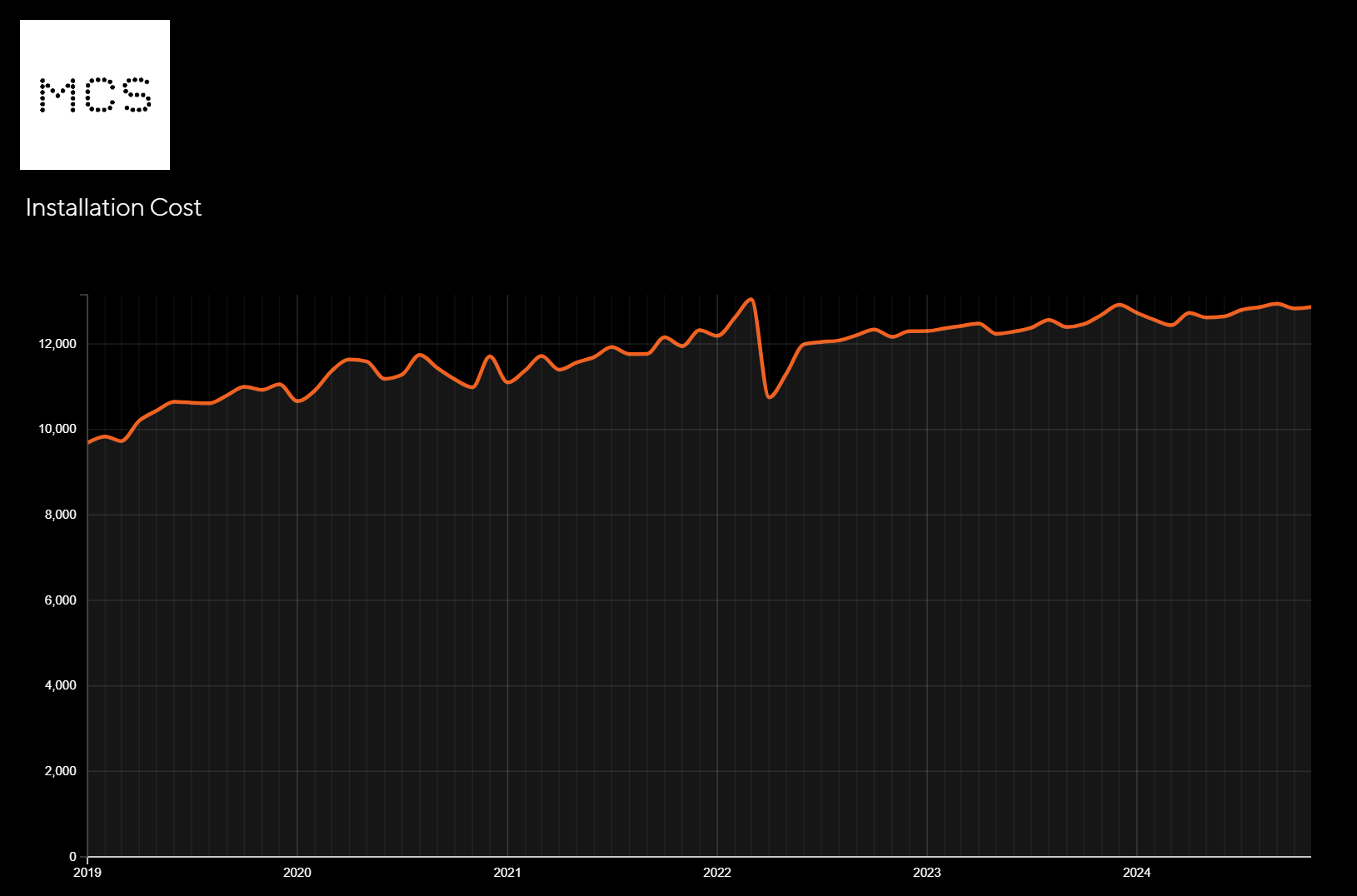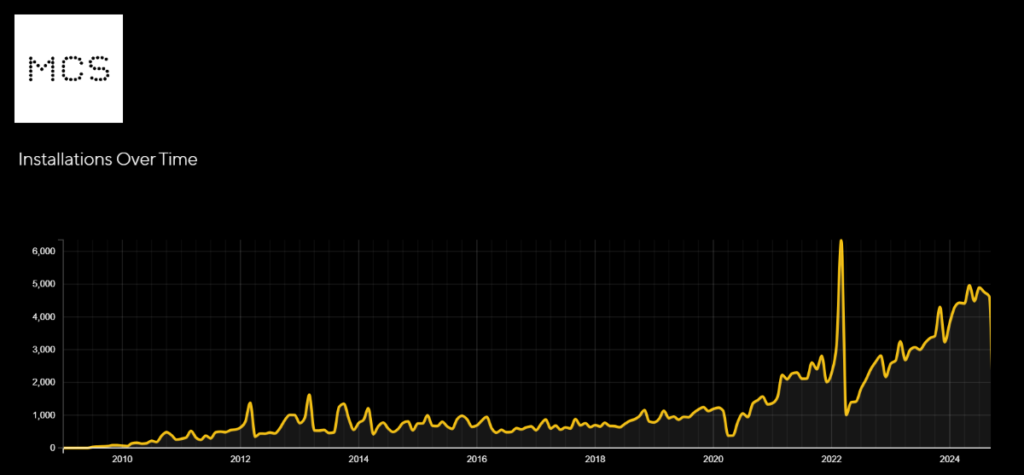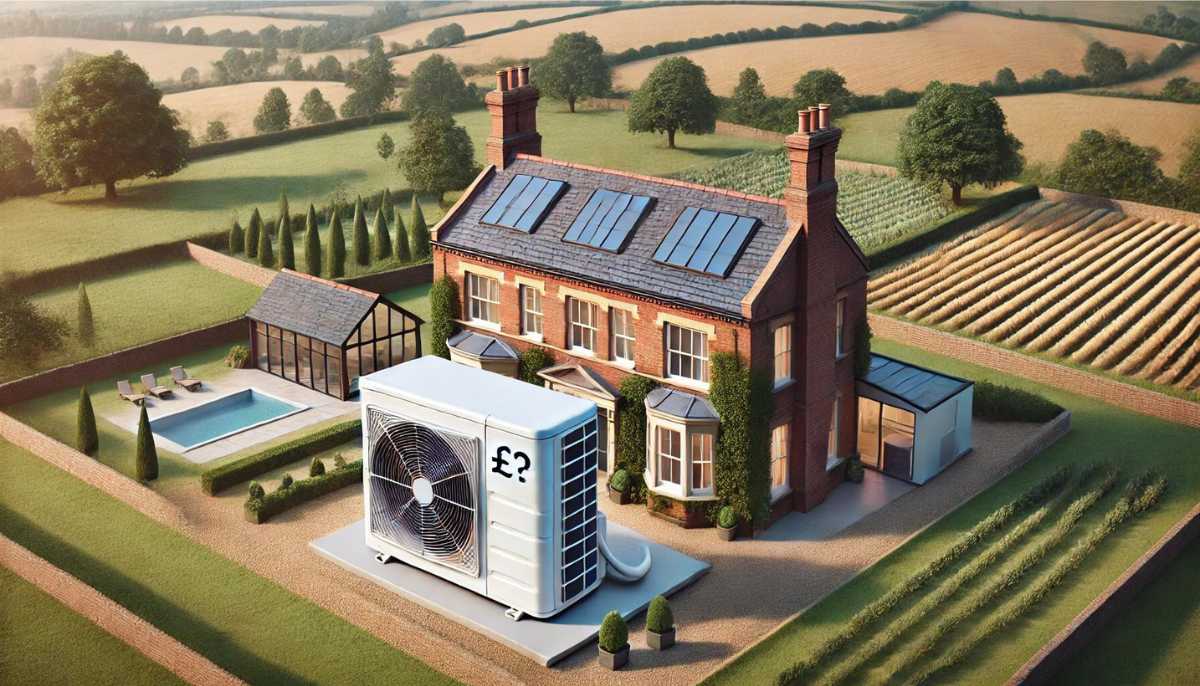The average cost of an air source heat pump in the UK is £12,868. You can get £7,500 off using the Boiler Upgrade Scheme (BUS), leaving the actual cost at £5,368.
This data is according to the MCS dashboard, based on November 2024 numbers.

These are average figures, and it must be said that heat pump costs vary dramatically based on your property. I’ll go into more detail below.
Cost of Heat Pumps in the UK
The average cost is £12,868, or £1,531 per kilowatt. A larger property will need more power, and you can see an illustration below.
| Size of System | Cost | Cost after £7.5k Grant |
| 6kW | £9,186 | £1,686 |
| 7kW | £10,717 | £3,217 |
| 8kW | £12,248 | £4,748 |
| 9kW | £13,779 | £6,279 |
However, this is only half the story. Unlike solar panels, where the cost is closely linked to the size of the system (i.e. more panels equal more cost), a heat pump system is not so simple.
Most of the cost comes from labour, not from the unit itself. In particular, some major factors which affect cost are:
- Size of property (larger properties have higher heat loss, and are generally more complicated installs)
- Insulation (too little requires additional work)
- Existing pipework (older, small bore pipes may need upgrading)
- Existing radiators (some radiators may need swapping for larger units)
- Additional equipment (e.g. a water tank)
I’ve written an article explaining these in more depth. But don’t let these factors put you off. If the average cost is £12,868, or £5,368 after the BUS grant, then your cost can come down, sometimes to under £1000. A few real life quotes will give you your answer.
Are there grants for heat pumps?
Yes. There is one whopping great grant called the Boiler Upgrade Scheme. It’s worth £7,500.
It’s fair to say it’s the most generous home improvement grant for a long time. And people are, understandably, rushing to get it.
The grant is valid if:
- You own your property
- You are replacing a fossil fuel heating system, including your hot water
Your installer will apply on your behalf, and take it off the bill.
There’s also no VAT on renewable products, adding a further saving.
Do heat pumps save money on energy?
It’s marginal, currently. Heat pumps are much more efficient than gas boilers, roughly 4x as efficient at turning the input energy into heat. Unfortunately electricity is also about 4x the cost of gas, which cancels this benefit out.
However, there are reasons to be optimistic. The UK government is pouring money into renewable energy, and over time this is hoped to bring the cost of electricity down.
But the main benefit is compatibility with solar. If you have solar panels, you can run your heat pump off the electricity generated, reducing your bill to effectively nil. You couldn’t do that with a gas boiler, and these combined systems are really the smartest way to get a heat pump.
Heat pump costs over time
The costs have been climbing over time, up 4.5% from September last year. Heat pumps have seen a huge surge in demand, which has contributed to price inflation.
In fact, the popularity of heat pumps is up 38% from last year, with 4,626 installs in September alone.

Can you get heat pumps on finance?
Yes. And there are other offers too, such as ultra-long warranties offered by companies such as Aira.
The argument here is that, once you’ve factored in maintenance costs, heat pumps start to look cheaper than boilers, which – as we all know – go wrong quite often.
Costs of other heat pumps
We’ve been talking here specifically about air-to-water heat pumps, which is the most common type of heat pump. These take heat from the air outside, and pass it to your radiator and hot water system.
There are also ground source heat pumps. These are much more expensive, at £22,200 across 2024, and £14,700 after the grant.
Then there are air-to-air heat pumps, which are essentially Aircon units. Air to air heat pumps are highly effective, and only cost £3000-£5000, however they aren’t eligible for the BUS grant.



